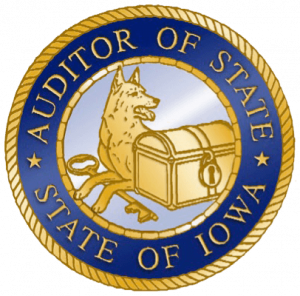State auditor faults Iowa Workforce Development for oversight, policies
July 23rd, 2025 by Ric Hanson
(Story from the Iowa Capital Dispatch) – The state auditor’s office has released a new report detailing almost two dozen deficiencies in Iowa Workforce Development’s policies and practices. The report faults IWD for failing to comply with its own policies and procedures to ensure the timely filing of reports; failing to properly review and approve quarterly reports; and failing to properly check the accuracy of information generated for financial reporting.
Auditor of State Rob Sand has recommended the department revise its policies and procedures to better identify ineligible claims for payment and to ensure background investigations are routinely performed as part of the hiring process. Sand is also recommending the department ensure that financial reconciliations are independently reviewed and that the agency either comply with current state law or seek to have outdated laws repealed. The report notes that 19 of the 22 deficiencies are issues cited in previous years’ audits. 
IWD officials did not immediately respond to a request for comment on the report, but the state agency’s written responses to individual findings indicate that IWD attributes many of the cited deficiencies to staff turnover within the department.
Among the issues cited by the state auditor:
Detection of fraud: Earlier this year, Jodi Spargur-Tate, a former program director at Children and Families of Iowa, was alleged to have improperly spent $427,000 in taxpayer money that originated with a U.S. Department of Labor job training grant that passed through IWD. Court records indicate Spargur-Tate has not been criminally charged in the case. According to the auditor’s office, it has repeatedly pointed out that since 2015, IWD has failed to oversee subrecipients of grant money such as CFI. In response to the new report raising the issue, IWD suggested CFI and others were also to blame, noting that “effective oversight requires reciprocal diligence by all stakeholders” and “at all levels.”
Internal oversight of federal funding: IWD is required to maintain effective internal controls over the award of federal money to ensure it is spent according to federal requirements. Part of the process involves the creation of financial reports, although auditors found that the total expenditures in those reports did not always agree with the state’s own accounting system. In total, the IWD reports “overstated $503,067,” the auditor found, adding that due to staff turnover IWD didn’t have adequate resources to ensure the reconciliation of financial records or ensure the records were properly reviewed and filed on a timely basis.
Cash management: Generally, a maximum of three days is considered acceptable between the receipt of federal funds and IWD’s disbursement of those funds. The auditor’s review of IWD records identified “excessive” cash balances in the millions of dollars. The auditor found that although procedures had been established to draw federal funds only in amounts sufficient to cover current needs, IWD did not review or update its procedures to account for federal draws associated with pandemic-related administrative programs and unemployment benefits.
Federal and state cost sharing: Some state expenses related to IWD work are funded through the federal government. IWD has a process for separately allocating certain costs to either federal or state programs based on a combination of the square footage and time devoted to the separate programs. Although IWD policies require certain elements of that cost-allocation process to be reviewed and updated quarterly, that work wasn’t always performed in 2024, affecting $892,043 in cost allocations, the auditor found. In response, IWD said that going forward, the quarterly review updates will instead be done annually unless there are significant changes that necessitate quarterly reviews.
Worker compensation: IWD failed to properly report “short time compensation” — payments to workers whose hours had been reduced to avoid layoffs — and other payouts throughout the fiscal year. “General ledgers were not maintained properly throughout fiscal year 2024,” the auditor found, and one account balance was overstated by $5.2 million while another was overstated by $5.1 million. The situation resulted in “undetected reporting errors and misstatements,” and increased the risk for further undetected reporting errors, the auditor concluded.
Accuracy of benefits: A program designed to determine the accuracy of paid and denied unemployment benefits calls for IWD to complete a financial review within 120 days of the end of a fiscal year. IWD management “decided to close cases if they were over 150 days old so that the Quality Control Department could focus on current cases,” the auditor found. However, Iowa Workforce Development did not have written instruction from the U.S. Department of Labor to close the cases and it was denied that relief by the DOL when it was requested, the auditor added. In its written response to that finding, IWD explained that after the pandemic the department had a complete turnover in benefit-accuracy management staff.





